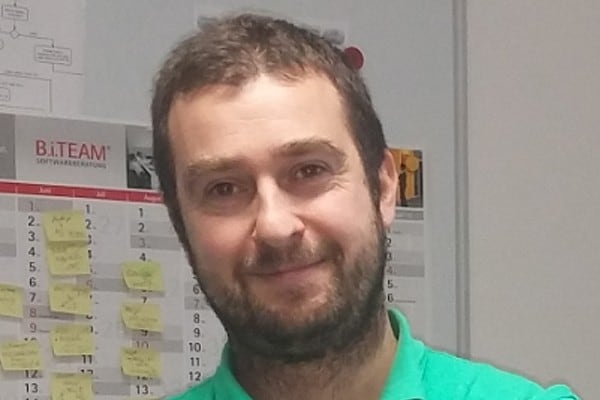Meet the data scientist: Manuel-David Garcia
By Stephanie Robertson, SAS Insights Editor
While he did study statistics, operations research and relational marketing, Manuel-David Garcia says his "real school" has come from on-the-job-training and knowledge transfer from colleagues. As part of our Data Scientist Series, we interviewed Garcia, a data scientist for a midsize company in Heidelberg, Germany.
What’s your background and education?
Garcia: I did some studies on applied statistics and operative research at the Complutense University of Madrid in Spain, while actively participating in student activities and enjoying some IT training (mainframe OS, functional analyst). Some years later, I did some specialization in relational marketing at the Institute of Digital Economics, Madrid. But the real school has been on-the-job training. I’ve learned by doing and the great knowledge transfer done with colleagues.

What skills help you most as a data scientist?
To me, data science means a path of learning, plus initiative to put hands-on and creative work to get the job done. Some domain knowledge (of marketing, for example) and the ability to deliver (an IT-background and data integration skills) are as important as finding data product opportunities.
When did you figure out you wanted to be a data scientist? What motivated you to become one?
This label is quite new, so it’s hard to say that I am data scientist, but I follow its spirit. I like to improve performance by taking advantage of data. The motivation is to get solve problems – that keeps your brain busy at work.
What department do you work in and who do you report to?
I work for a midsize company that runs operations in five European countries and I report directly to the CEO/CFO/COO. There is no specific department related to my function, so I am a kind of in-house freelancer, but I stay busy following the priorities defined by my manager.
How long have you had your job and were you hired specifically to be a data scientist?
I have worked with data for 15 years and have been in my current job for two years. I was hired to help the company provide more relevant offers and recommendations to our consumers and to answer complex business questions related to consumers (for example, understanding their behavior).
Do you work on a team? If so, what’s the makeup of your team?
I work as a one-man data analytic department. Because we have a horizontal hierarchy, my teammates are all colleagues in other departments involved on the specific initiative (performance managers, customer support, email marketing, IT).
What’s your job like? Is there a typical day or is each day different? Can you give us a basic idea of what you do and the kind of projects you work on?
I’m lucky – I have a clear list of to-dos, which are reviewed with my manager once a week. Not every day is different but I work for an agile company, which requires me to be flexible and adapt to circumstances. Last week, for example, I was doing several tasks, including improving recommendation scores; tuning the integration with the operational content management system; creating new transformed variables based on consumer behavior to be used for affinity models; and doing some refactoring of existing performance reports/analytical dashboards.
Is your job what you expected it to be?
Yes, the job description matched part of the job I am doing today, but along the way I’ve been extending my scope because data-related roles are changing fast due to new technologies, open-source projects, software provider solutions and the cloud. So my guess is that 99% of the current data-related job descriptions may be outdated after two years.
What’s your biggest challenge?
My time is limited so the biggest challenge is figuring out how to improve skills based on current technologies, algorithms and variety of programming languages (not being influenced by short-term trends), and looking for technologies and platforms that may help us improve and be profitable.
What’s your biggest accomplishment thus far?
It’s hard to answer because in data analytics measuring ROI is important, but not always possible. I built complex automated analytical systems using SAS that could deliver the right message to the right consumers (segmentation/personalization/digital marketing). It’s been quite profitable to the company. In addition, I’ve built a complex recommendation system using a mix of platforms integrated within the consumer journey that has resulted in a very positive lift of response. But the biggest accomplishment may be the continuous improvement and steps forward that I keep taking to reach these goals.
What do you enjoy doing in your spare time?
Along with enjoying time with my friends and the nice environment of Heidelberg, for many years I've worked with a nonprofit organization related GLTB human rights, coordinating all related digital infrastructure topics (administration of web servers/email accounts, SEM, content management systems and providing social strategy workshops). A few months ago, I also started participating on the MADdata Datathon of Madrid (open data competition) within the social innovation stream, proposing a data product for fighting against gender discrimination. Since the team I participated on won the competition, I may be busy working to help this collaborative nonprofit project become a reality.
Read More
- Whether you want to find out what data scientists do, hear from some real-life data scientists or learn how to become one, check out all the articles in our Data Scientist Series:
Get More Insights
Want more Insights from SAS? Subscribe to our Insights newsletter. Or check back often to get more insights on the topics you care about, including analytics, big data, data management, marketing, and risk & fraud.
